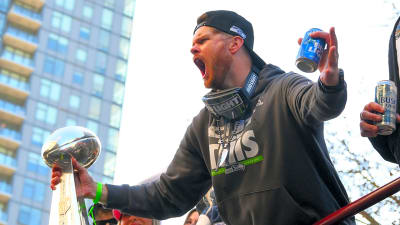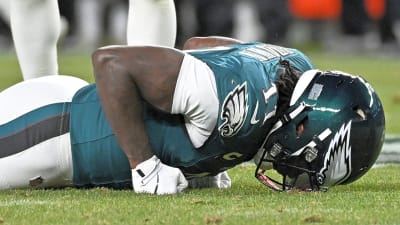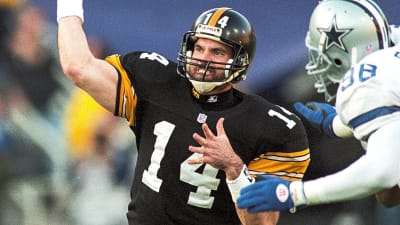
Plenty of names come to mind when thinking about the decades of greatness that define UNC basketball. Michael Jordan. James Worthy. Roy Williams. But one name laid the groundwork for them all.
Amid a time of recruiting scandals, racial tension, and a sport in need of reinvention, Dean Smith became the catalyst for change that would forever reshape both UNC basketball and the NCAA.
Commissioned as a second lieutenant in the U.S. Air Force on June 7, 1954, Smith was stationed at an Air Base in Germany, where he played on a team that won the Air Force Championship of Europe. His big break, however, would come stateside.
In 1958, North Carolina head coach Frank McGuire invited him to join his staff as an assistant. Smith served under McGuire for three years, until 1961, when McGuire was forced to resign following a major recruiting scandal and an ensuing NCAA probation.
At the time, North Carolina was also deemphasizing basketball by cutting down on their regular season schedule due to a national point-shaving scandal that weighed heavily on the program and ACC.
As noted in Blue Blood: Duke-Carolina: Inside the Most Storied Rivalry in College Hoops, when Chancellor William Aycock named Dean Smith as head coach that year, he told the 30-year-old Smith that wins and losses didn't matter as much as running a clean program and representing the university well.
The First Season
In that first season as head coach, Dean Smith faced an 8-9 losing season, one of the losses resulting in frustrated students famously hanging an effigy of Smith in protest. That first season would go on to be the first and last losing season of Smith’s career as head coach.
From 1965 onward, Smith's teams never finished worse than tied for third in the ACC. But as Aycock mentioned, it wasn't the wins and losses that mattered most. Beyond records and championships, Smith laid the foundation for much of what UNC basketball and the NCAA is now.
The most popular technique attributed to him is the implementation of John McLendon's four corners offense, a strategy for stalling with a lead near the end of the game.
Smith's teams executed the four corners set so effectively that in 1985 the NCAA instituted a shot clock to speed up play and minimize ball-control offense.
He was also credited with popularizing techniques such as the "tired signal" for a player to indicate that he needed to come out for a rest, huddling at the free throw line before a foul shot, encouraging players who scored a basket to point a finger at the teammate who passed them the ball to honor the passer's selflessness, and creating a number of defensive sets that a point guard would call for.
As one of his many acts of making sure every player felt valued, Smith also instituted the practice of starting all his team's seniors on the last home game of the season as a way of honoring the contributions of the substitutes as well as the starters.
In a season when the team included six seniors, he put all six on the floor at the beginning of the game and drew a technical foul, rather than leaving one of them out.
While Smith was credited with countless innovations on the court and helped shape players who would become legends (Phil Ford, Michael Jordan, Sam Perkins, and so many others), one of his most meaningful recruitments came in the form of Charlie Scott, North Carolina’s first Black scholarship athlete.
It was a decision that went far beyond basketball, and it wasn’t the first—or the last—time Dean Smith made a quiet but powerful stand for equality and integration.
Long before his time at Chapel Hill, as a high school student in Topeka, Kansas, he repeatedly visited his principal’s office to argue that the school’s segregated basketball teams should merge. After the 1948-49 season, and plenty of persistence, Topeka High School’s basketball team finally integrated.
Smith never wavered in his beliefs, even as a coach in the South where every move, on or off the court, was watched and judged. As his platform grew, so did his quiet acts of conviction.
In Chapel Hill, he joined a local pastor and a Black theology student to integrate a restaurant, a simple meal that carried the weight of change. He was also noted as having helped black graduate students purchase homes in all-white neighborhoods, opening doors where they had long been closed.
But Smith’s sense of justice stretched beyond race. He spoke out about the injustices of the world frequently, recording radio spots calling for a freeze on nuclear weapons and lending his voice to the fight against the death penalty.
At times, he even took his team into prisons for practice and arranged visits to death row so that his players could see the human side of injustice in America’s prison system.
By the time he retired in 1997, Dean Smith’s numbers spoke for themselves:
- 879 career wins (the most in NCAA history at the time)
- Two national championships (1982, 1993)
- 11 Final Fours
- 17 ACC regular-season titles
- 36 consecutive winning seasons
But his real legacy lives in the countless players, coaches, and communities shaped by his example.
In an era where college basketball is increasingly driven by money, media, and the transfer portal, Smith’s example feels even more powerful. He proved that a coach could win big without compromising integrity, that greatness and goodness could coexist on the same sideline.
His influence echoes in every huddle, every unselfish pass, every program that tries to do things “the Carolina Way.”
To
More must-reads:
- Ex-Lakers champion sparks backlash with his Victor Wembanyama comments
- Tanks for nothing: NBA fines Jazz, Pacers for recent 'tanking' efforts
- The 'Super Bowl winning coaches' quiz
Breaking News
Trending News
Customize Your Newsletter
 +
+
Get the latest news and rumors, customized to your favorite sports and teams. Emailed daily. Always free!








